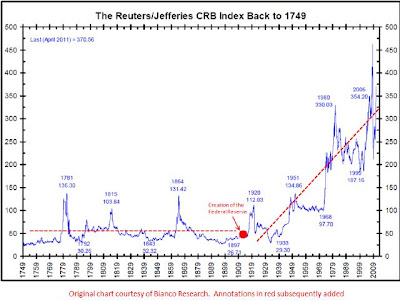 To my knowledge, Mr. Bernanke has never done this before. He has laid out his delusional belief system for all to see. (Ben Bernanke, a former Princeton University professor, is the Chairman of the US Federal Reserve, a private corporation which manages money supply and interest rates in the US.)
To my knowledge, Mr. Bernanke has never done this before. He has laid out his delusional belief system for all to see. (Ben Bernanke, a former Princeton University professor, is the Chairman of the US Federal Reserve, a private corporation which manages money supply and interest rates in the US.)Indeed, the emperor has no clothes.
 Joe Weisenthal, an intrepid reporter with Business Insider who has a notable nose for news, summarized Mr. Bernanke's first lecture on the history of the Federal Reserve as follows. Note that Mr. Bernanke began by attacking the gold standard. That was mistake number one. Mr. Bernanke's multitudinous errors proceed from there....
Joe Weisenthal, an intrepid reporter with Business Insider who has a notable nose for news, summarized Mr. Bernanke's first lecture on the history of the Federal Reserve as follows. Note that Mr. Bernanke began by attacking the gold standard. That was mistake number one. Mr. Bernanke's multitudinous errors proceed from there....In my family archives, I still have an essay written by my father on the gold standard from his college days in the late 1930s. Let me tell you, my father got it right over 70 years ago, and Mr. Bernanke has gotten it 100% wrong today. Would that my father had chaired the Federal Reserve instead of Mr. Bernanke (and before him, Mr. Greenspan).
 Mr. Wiesenthal, who is indefatigable, summarized Mr. Bernanke's speech as follows:
Mr. Wiesenthal, who is indefatigable, summarized Mr. Bernanke's speech as follows:- To have a gold standard, you have to go dig up gold in South Africa and put it in a basement in New York. It's nonsensical.
- The gold standard ends up linking everyone's currencies, causing policy in one country to transmit to another country (sort of how U.S. policy now transmits to China, because they've fixed the yuan price to the dollar). So for example, if the U.K. fixes the number of pounds to an ounce of gold, and the U.S. fixes the number of dollars to an ounce of gold, then the pound and the U.S. dollar inadvertently become linked.
- It creates deflation, as William Jennings Bryan noted. The meaning of the "cross of gold" speech: Because farmers had debts fixed in gold, loss of pricing power in commodities killed them.
- The gold standard tends to cause interest rates to rise during downturns and interest rates to fall during good times, the exact opposite of what monetary policy should be doing.
- The economy was far more volatile under the gold standard (all the depressions and recessions back in the pre-Fed days).
- The only way the gold standard works is if people are convinced that the central bank ONLY cares about maintaining the gold standard. The moment there's a hint of another priority (like falling unemployment) it all falls apart.
- Gold standards leave central banks open to speculative runs, since they usually don't hold all the gold.
 I replied to Mr. Weisenthal's summary as follows:
I replied to Mr. Weisenthal's summary as follows:"Just to summarize, Bernanke is wrong on every point. However, this is the clearest exposition yet of his twisted logic. Others will refute this completely, so permit me to highlight a couple of the more subtle points:
1. We lock gold away because it is a real and rare substance that has real value (humans want it for many reasons, creating demand).
2. The interlinking prevents one trading partner from cheating another with bad money (as the US has done to China).
3. Deflation is the desired outcome of increasing productivity.
4. Savings are rewarded during downturns, creating income stability for the prudent, as well as future capital for business investment (also by the prudent).
5. The point about volatility is true. However, that kind of volatility (A) teaches everyone to be cautious vs reckless, and (B) prevents black swans, which emerge when volatility is suppressed by central banks while the underlying system rots.
6. It is not the job of any central bank or government to target employment. Free markets do that all my themselves.
7. Let's look at the run on the US gold hoard in the early 70s. Oh yeah, the US was running a guns and butter policy and undermining its currency. The French figured that out and took their gold. So governments that manage their budgets foolishly get punished by the free market. Hmmm. That is bad? Why was that again?
 "To be clear, von Mises dealt with all of Bernanke's points half a century ago. However, knowing that Mr. Bernanke thinks this way helps me sleep more soundly at night as a gold investor. It's amazing how the smartest people can rationalize the most egregious behaviours.
"To be clear, von Mises dealt with all of Bernanke's points half a century ago. However, knowing that Mr. Bernanke thinks this way helps me sleep more soundly at night as a gold investor. It's amazing how the smartest people can rationalize the most egregious behaviours."Mr. Bernanke, that will be a big round 'zero' on your term paper. Please go back to kindergarten and start over"



